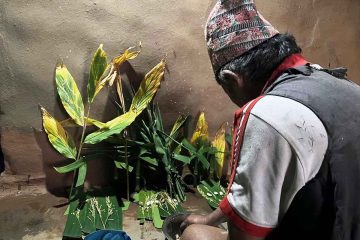Long ago, in the distant hills of Limbuwan, there resided a mother and her daughter in a secluded village surrounded by dense forests. Since the villagers lacked knowledge of agricultural practices, they had to depend on the fruits and roots that they gathered from the abundant forest. This reliance on nature’s provisions forged a strong bond between the community and the wilderness that sustained them, fostering a harmonious coexistence between the people and their natural surroundings.

One day, the mother returned from the forest with a bountiful supply of mushrooms to serve as the day’s main meal. The following morning, she carefully laid out the mushrooms on a smooth, flat stone, instructing her daughter to keep a vigilant eye on them while she ventured back into the forest to forage for additional sustenance as part of her daily routine.

Upon returning home in the evening feeling utterly exhausted and famished, she was disheartened to discover that the mushroom she had left to cook had dwindled into a meager mound. Enraged at the sight of the diminished mushroom, her frustrations boiled over, leading her to unleash a torrent of brutal blows upon her daughter with unrelenting force. Tragically, the ferocity of her assault proved fatal, claiming her daughter’s life in that very moment. Faced with the grim reality of her actions, she hastily disposed of her daughter’s lifeless body by submerging it deep within the murky depths of a secluded river.

The following day arrived, and she ventured into the dense forest in pursuit of sustenance, only to return once more carrying a fresh harvest of mushrooms. As she customarily did, she carefully laid out the mushrooms on a smooth stone surface, before setting off once more into the forest to search for other edible provisions. Upon her return to the humble dwelling, she was met with a disheartening sight – the mushrooms had dried up and shriveled. This unfortunate occurrence triggered a profound realization within her, prompting deep regret and sorrow as she reflected on the tragic consequences of her past actions in the terrible mistake of taking her daughter’s life in a fit of rage.

The next day, consumed by sorrow and pain, she made her way to the pool with a heavy heart, hoping against hope that her daughter’s lifeless body would no longer be there. However, as she approached the water’s edge, her worst fears were confirmed – her precious child’s body still floated eerily in the river’s embrace, almost peaceful as if in a deep slumber. The grief-stricken mother gazed at the heartbreaking sight for what felt like an eternity, each moment etching her daughter’s memory deeper into her anguished soul. Even in her daily quest for sustenance in the forest, the haunting image of her daughter’s lifeless form along the riverbank was an ever-constant, painful reminder of the tragedy that had befallen her.

One tragic day, a devastating flood ravaged the river, carrying along the lifeless body of the mother’s beloved daughter. Overwhelmed with grief, the mother rushed to the riverbank to locate her daughter’s remains, only to be met with emptiness. The water surged with a fierce and unforgiving strength, making search efforts treacherous. Fueled by desperation, the mother bravely plunged into the murky depths, her heart heavy with sorrow. Despite her courageous attempts, the relentless current proved too powerful, dragging her into its depths, and swallowed her forever.

In her next life, she was reborn as a graceful bird, embodying a mystical connection to her past. As the bird, believed to be the ghostly presence of her mother, she echoes the haunting call of “Semek… Semek….” through the misty forests. When the skies weep with rain, her sorrowful cries resonate, piercing the silence as she searches tirelessly for her lost daughter amid the meandering rivers. Within the Yakthung Limbu community, this bird is known as Semekawa, a symbol of eternal love and longing transcending time and form.

The Yakthung Limbu people have a unique cultural practice of chasing away birds whenever they soar over their homes. This tradition stems from their belief that the crying of birds signifies an omen of ill-fortune, particularly for their children, leading to the faith that such cries could potentially bring harm or even death to their young ones. Additionally, these people hold the conviction that children should be treated gently and with kindness, as they firmly believe that scolding and physical punishment have no place in raising well-adjusted and happy children.




